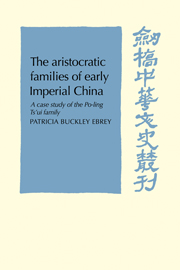Book contents
- Frontmatter
- Contents
- List of tables
- Acknowledgements
- Chronology of the Chinese dynasties
- 1 Introduction
- 2 The historical development of the aristocratic families
- 3 Origins of the Ts'uis in the Han
- 4 The Ts'uis in the aristocratic age
- 5 The Ts'uis as an old family in the T'ang
- 6 Implications and conclusions
- Notes to the text
- Appendix I The reliability of the genealogical tables in the Hsin T'ang shu
- Appendix II Annotated genealogy of the descendants of Ts'ui Yen, d. 646
- Appendix III Marriages of Po-ling Ts'uis during the T'ang
- Bibliography
- Glossary
- Index
4 - The Ts'uis in the aristocratic age
Published online by Cambridge University Press: 04 August 2010
- Frontmatter
- Contents
- List of tables
- Acknowledgements
- Chronology of the Chinese dynasties
- 1 Introduction
- 2 The historical development of the aristocratic families
- 3 Origins of the Ts'uis in the Han
- 4 The Ts'uis in the aristocratic age
- 5 The Ts'uis as an old family in the T'ang
- 6 Implications and conclusions
- Notes to the text
- Appendix I The reliability of the genealogical tables in the Hsin T'ang shu
- Appendix II Annotated genealogy of the descendants of Ts'ui Yen, d. 646
- Appendix III Marriages of Po-ling Ts'uis during the T'ang
- Bibliography
- Glossary
- Index
Summary
From the fall of the Han until the reunification of the country under the Sui Dynasty, the social and political systems of China were distinctly aristocratic. In this period large parts of the upper class gained recognized powers and privileges which could be transmitted to their children. Little is known of the Ts'uis who lived during the Wei and Chin Dynasties and no Ts'uis served the Southern Dynasties. During the Northern Dynasties, however, a lineage of Ts'uis, still settled in Po-ling, became one of the highest aristocratic families. The dynastic histories mention more than a hundred of their men, most of whom held office, a few occupying distinguished positions.
The Wei and Chin dynasties (220–311)
When the social and political structure of the Later Han dynasty collapsed in the 180s, the area of the Ts'uis' home, mid-Hopei, was thrown into almost continual upheaval. From 184 to 205 this region was periodically under the control of peasant rebels, including Chang Chüeh, Chang Niu-chueh, and Chang Yen. As an area with dense population and good farmland, mid- Hopei was also a prize frequently contested by rival warlords. Yuan Shao and his son Shang, scions of one of the most eminent Han families, controlled much of the Northeast from 190 to 204. Ts'ui Lieh's son Chiin was among their supporters. After 204 Ts'ao Ts'ao ruled all of north China. As discussed in Chapter Two, the state formed by the Wei and Chin was different from the Later Han in several fundamental respects.
- Type
- Chapter
- Information
- The Aristocratic Families in Early Imperial ChinaA Case Study of the Po-Ling Ts'ui Family, pp. 50 - 86Publisher: Cambridge University PressPrint publication year: 1978



